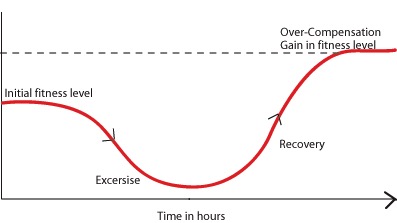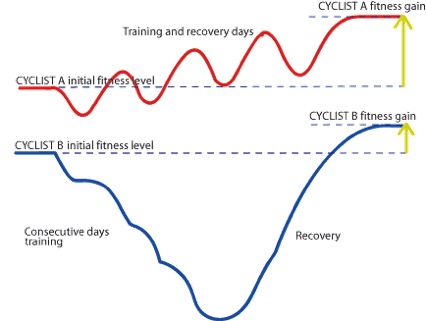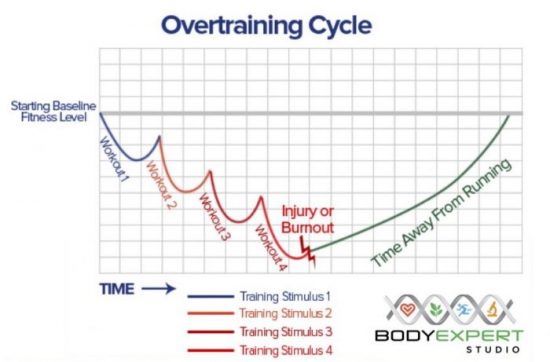The Essentials of Recovery
The Essentials of Recovery:
There is a culture or myth that in fitness and sports performance… MORE is better. Rest and recovery are as of equal importance as the training or workout portion of the regime when devising a programme. However, because people think they get the training benefits by ‘doing’ they often overlook or don’t understand the importance of rest and recovery.
Recovery is the key! Recovery is critically important when applied to sports training because without it we do not adapt physically to become fitter, stronger or faster.
Something in our society, whether it is in relation to sport or work, seems to make us think that admitting we need more rest is bad. If you are seen to train everyday for example, then psychologically you could ‘look’ and ‘feel’ stronger for it. If you analyse how you really feel though, it most probably comes down to your mental frame of mind. The thought that “the harder I workout or the more I do, the better”! The fact that working smarter not necessarily harder will reap the most favourable results due to eliciting the most beneficial hormone response or gene expression.
When we exercise, we don’t get stronger. When we exercise, we actually break down our energy systems and muscles and get weaker. The more exercise we do, the weaker we can become and the more susceptible we are to illness and injury – termed ‘over training’. For that reason, gains in your fitness come from recovering. Thus it is this combination of exercise and recovery that brings you to your new level of fitness. Diagram 1 below illustrates the basic concept of exercise adaptation:
 Diagram 1: Adaptation to exercise
Diagram 1: Adaptation to exercise
From our initial fitness level we apply a stimulus (weight training, walking, sprinting, etc), and as training is a catabolic process our fitness level drops. You effectively destroy or break tissue fibre through the effort of working out. Our body then requires rest, in which time the body recovers (or rebuilds the damaged tissue). The human body is an amazing creation and as the base level of fitness is reached, it feels the need to compensate in anticipation of the next training session; this adjustment is what is known as super-compensation or over-compensation.
However, it is very important to note that if there is too much of a stimulus, if the training load is too great, then the body will not adapt optimally. Likewise, if you do not allow your body ideal conditions to recover, especially at this time of year with all the alcohol and late nights, as well as increased end of year work load or stress you can quite easily become injured or sick.
The body will respond best by performing small ‘bite-sized loads’ that are pitched at the correct ability level of the individual and then progressively increase as the body slowly adapts. For instance, a first time weight lifter should not be attempting to perform a maximal strength programme before acquiring the necessary stabilisation and strength endurance competencies (periodisation phases). Maximal strength exercises will over-load the muscle and connective tissue excessively and create a state bordering injury rather than compensation.
If an individual does not allow their body to recover and each additional training stimulus creates a further decline in fitness and performance (fatigued and over-trained state). Diagram 2 illustrates the common training practice that results in overtraining:
Diagram 2: Over-training model
People have different rates of recovery and for this reason it is not possible for anyone other than the individual to predict recovery. There are basic guidelines to follow but knowing when to rest/recover depends on a large number of factors and when performing at an advanced level requires experience through trial and error.
The recovery and compensation process is the key to gaining optimal results. Each time the body reaches the compensation state (which then becomes the new fitness level) new stimulus should be applied to develop further super-compensation. Take a look at the hypothetical diagram 3, which uses the example of two cyclists: rider A and rider B cycling over a month:

Diagram 3: Adequate recovery & over-training model
Cyclist A demonstrates the ideal training to recovery ratio, where each new training session is conducted once compensation has been achieved. Thus creating a gradual increase in fitness and performance. In contrast, Cyclist B has not allowed their body to recover and each additional training stimulus creates a further decline in fitness and performance (fatigued and over-trained state). In real life the graphs would never be as uniform as the above but they clearly demonstrate the training ideology and response to stimulus over time.
The graphs establish that Cyclist B has performed less training days in total and had to recover for twice as long while at the same time sacrificing the quality of their rides or training sessions. They could not perform at ideal levels (intensity) due to fatigue. I think this diagram is very generous to Cyclist B, as having to rest for 2 weeks, I would think the fitness gains would be smaller, if any at all, considering the deterioration of exercise quality during the fatigued state. What Cyclist B’s graph demonstrates is the classic model of over-training… The risk of injury of this cycle is extremely high and the requirement to recover for 2 whole weeks would most likely have negative psychological affects on the cyclist. If Cyclist B would continue in this manner… due to inadequate recovery the graph would continue to decline and eventually lead to illness and injury.
Body Expert Systems take home recovery tips:
- Intensity and volume are the key factors in deciding how much rest is necessary… the higher the intensity and volume of work completed the more rest required.
- Beginner/baseline guidelines: wait 24 hours before training the same muscle group, energy system or movement if performed an maximal intensity
- Try to train with quality in mind: don’t train too many days consecutively.
- Good nutrition and quality sleep will maximise recovery rates
- Make sure you plan inter-mesocycle breaks of around a week long. Try to monitor your ‘recovery curve’ through performance indicators; i.e. strength gains/plateau, joint discomfort, fatigue, etc
The golden rule to follow is: if you honestly feel tired then take a rest. Don’t carry out your workout just because your programme – a piece of paper – has it in the schedule. There are many influencing factors placing stress on our bodies and it’s important to be flexible with your training routine.
Join our online and email community to keep up-to-date with our articles, recipes, workouts and awesome events








